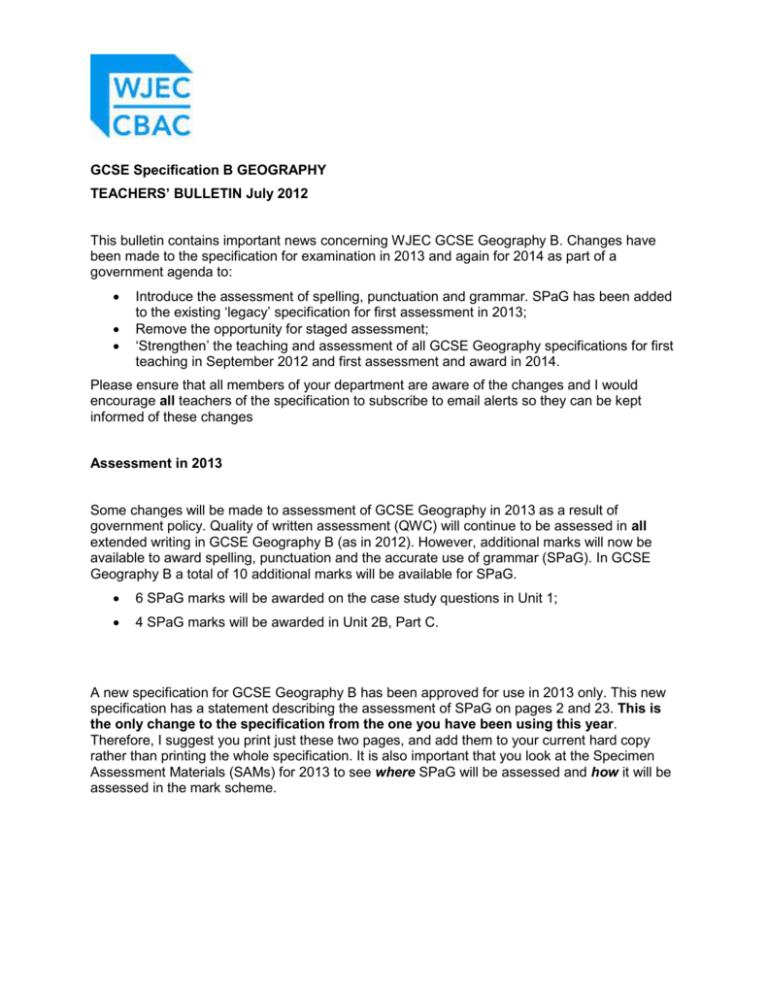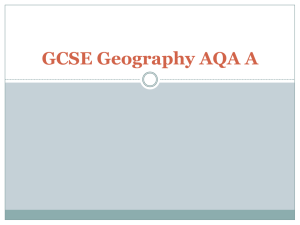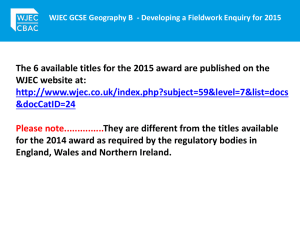TEACHERS` BULLETIN July 2012
advertisement

GCSE Specification B GEOGRAPHY TEACHERS’ BULLETIN July 2012 This bulletin contains important news concerning WJEC GCSE Geography B. Changes have been made to the specification for examination in 2013 and again for 2014 as part of a government agenda to: Introduce the assessment of spelling, punctuation and grammar. SPaG has been added to the existing ‘legacy’ specification for first assessment in 2013; Remove the opportunity for staged assessment; ‘Strengthen’ the teaching and assessment of all GCSE Geography specifications for first teaching in September 2012 and first assessment and award in 2014. Please ensure that all members of your department are aware of the changes and I would encourage all teachers of the specification to subscribe to email alerts so they can be kept informed of these changes Assessment in 2013 Some changes will be made to assessment of GCSE Geography in 2013 as a result of government policy. Quality of written assessment (QWC) will continue to be assessed in all extended writing in GCSE Geography B (as in 2012). However, additional marks will now be available to award spelling, punctuation and the accurate use of grammar (SPaG). In GCSE Geography B a total of 10 additional marks will be available for SPaG. 6 SPaG marks will be awarded on the case study questions in Unit 1; 4 SPaG marks will be awarded in Unit 2B, Part C. A new specification for GCSE Geography B has been approved for use in 2013 only. This new specification has a statement describing the assessment of SPaG on pages 2 and 23. This is the only change to the specification from the one you have been using this year. Therefore, I suggest you print just these two pages, and add them to your current hard copy rather than printing the whole specification. It is also important that you look at the Specimen Assessment Materials (SAMs) for 2013 to see where SPaG will be assessed and how it will be assessed in the mark scheme. The ‘strengthened’ specification: first teaching in September 2012 and first award in 2014 I am delighted to announce that GCSE Geography B has been approved by the regulator for teaching in September 2012 and first assessment in 2014. The approval of the specification has resulted in some important changes. However, many things remain fundamentally unchanged. The specification still: Has its roots in Avery Hill geography; Requires student-centred schemes of work that demand geographical issues are investigated; Expects students to investigate the viewpoints, values and attitudes of range of different people / organisations when examining geographical issues; Has the same external assessment package i.e. the style and length of exam for Unit 1 and Unit 2 are largely unchanged; The main changes can be summarised as follows: All themes have been rewritten to provide greater clarity about what must be covered. This includes eighteen generic case studies, to be contextualised within centres; Themes have been restructured in order to provide a more logical route through the specification; Themes 2 and 3 have some new content that provide a greater emphasis on the processes of physical geography; The number of pieces of controlled assessment has been reduced from two to one; There will be more opportunities for extended writing in Units 1 and 2A for higher tier candidates. WJEC has been working hard since the end of January to make changes that satisfy both the Principal Examiners and the regulators. The Principal Examiners and I appreciate that these changes will require teachers to amend their schemes of work and that little time is left before the summer holidays begin. I apologise for the inconvenience caused. Since the fewest changes occur in Theme 1 I suggest that teachers might be well advised to start teaching this theme in September, thereby creating a little time to review schemes of work for Themes 2 and 3 during the autumn term. The Principal Examiners and I will provide further details about these changes during the autumn CPD events, as well as reviewing the performance of candidates in the summer series of 2012. Details relating to the CPD events can be found at: http://www.wjec.co.uk/index.php?nav=13&stage=3&cID=55 Details of the changes to the specification for first teaching in September 2012 Availability of assessment (pages 2) This specification is only available as a linear specification in both England and Wales. Rationale (pages 3 – 4) This section of the specification explains what makes Geography B distinctive. It makes it clear that issues must be explored. Specification content / case studies (pages 7 – 9) This summary of the content has been rewritten. The table on page 7 (reproduced below) explains the function of each column used on pages 14 - 23. One of the most fundamental changes we have made is to remove the suggested teaching strategies from the fourth column. Suggested strategies (focussing on those that could be used for ICT and research) are now summarised on page 9. The fourth column is now used to describe the generic case studies that must be taught in order to cover the content of the specification. Content (page 14 – 23) The biggest changes have been made on these pages. We wanted to clarify what must be taught. The regulators wanted us to strengthen the teaching of physical geography. The result has been a wholesale rewrite of the content of each theme. However, we were keen to preserve as much of the existing content as possible so that teachers could continue to use existing resources. Consequently, although the wording has changed, closer inspection shows that much of what you are currently teaching is still relevant. The biggest changes are: Key Ideas have been restructured to provide a more logical route through each theme; The depth of coverage column has been written to clarify exactly what should be taught, and what could be assessed. We suggest you use this column to audit your existing scheme of work. Six generic case studies have been added to each theme. Teachers still have the opportunity to choose an appropriate location for each of these case studies. We hope that this will provide clarity and focus candidate’s revision on a limited number of real places; LEDC/ MEDC references have been deleted and replaced with an expectation that candidates study countries at different levels of development. Theme 2 now makes greater demands on students understanding the processes of physical geography. However, key questions that focus on the management of the physical environment remain largely unchanged. Ecosystems have been moved back into Theme 2, but water (and its impact on development) has been moved into Theme 3. These changes have been made to try to create three themes of roughly equal length. We recommend that you spend 35 – 40 hours teaching each theme. However, you will need to spend an additional 23 hours on whichever theme becomes the focus of your fieldwork enquiry. Assessment Objectives (page 26) The assessment objectives for Unit 3 have been adjusted slightly to give a greater weighting to AO3 which rewards the candidate’s ability to select and use a variety of skills, techniques and technologies to investigate, analyse and evaluate questions and issues. This greater weighting is made in the new mark scheme for the fieldwork enquiry which can be found on pages 36 – 37. Task setting (page 30) The instructions for setting the controlled assessment task have been amended to provide greater clarity. The generic tasks for the 2014 award can be found on page 30 of the specification. Generic fieldwork enquiry tasks will be changed annually and published on the WJEC website. In future cycles the generic tasks will be published in June, before teaching starts in September of a two year course, eg the tasks for award in 2015 will be published in June 2013. WJEC will continue to provide advice to all centres, on the development of contextualised tasks, via the website. Framework for the fieldwork enquiry (page 34) This flow chart has been amended. It provides a simple framework which allows candidates to structure and sequence their report. Mark scheme for the fieldwork enquiry (page 36 - 37) The level descriptors for the enquiry have been rewritten to make it easier for teachers to apply the mark scheme consistently and to challenge and reward candidates at levels 3 and 4 who show evidence of independent work, for example in the data they collect and the methods they use to process and refine the data. Contacts Please do not hesitate to contact us with any queries. Andy Owen Subject Officer: GCSE Geography andrew.owen@wjec.co.uk Telephone (029) 20265114 Fax (029) 20575994 Andrew Williams Subject Support Officer andrew.williams@wjec.co.uk Telephone (029) 20265141 Fax (029) 20575994 Rob Bisatt GCSE section (for examiner applications) rob.bisatt@wjec.co.uk Telephone (029) 20265151 Website http://www.wjec.co.uk DISCLAIMER Internet communications are not secure and therefore WJEC does not accept legal responsibility for the contents of this message. Any views or opinions expressed in this message are solely those of the author and not necessarily those of WJEC, unless otherwise specifically stated. Please note that WJEC may intercept incoming and outgoing email communications. YMWADIAD Nid yw cyfathrebiadau rhyngrwyd yn ddiogel ac felly nid yw CBAC yn derbyn cyfrifoldeb cyfreithiol am gynnwys y neges hon. Safbwyntiau neu farn yr awdur yn unig yw'r rhai a fynegir yn y neges hon ac nid ydynt o angenrhaid yn adlewyrchu safbwyntiau neu farn CBAC, oni nodir hynny'n benodol. Gofynnir i chi nodi y gall CBAC atal cyfathrebiadau e-bost mewnol neu allanol.








